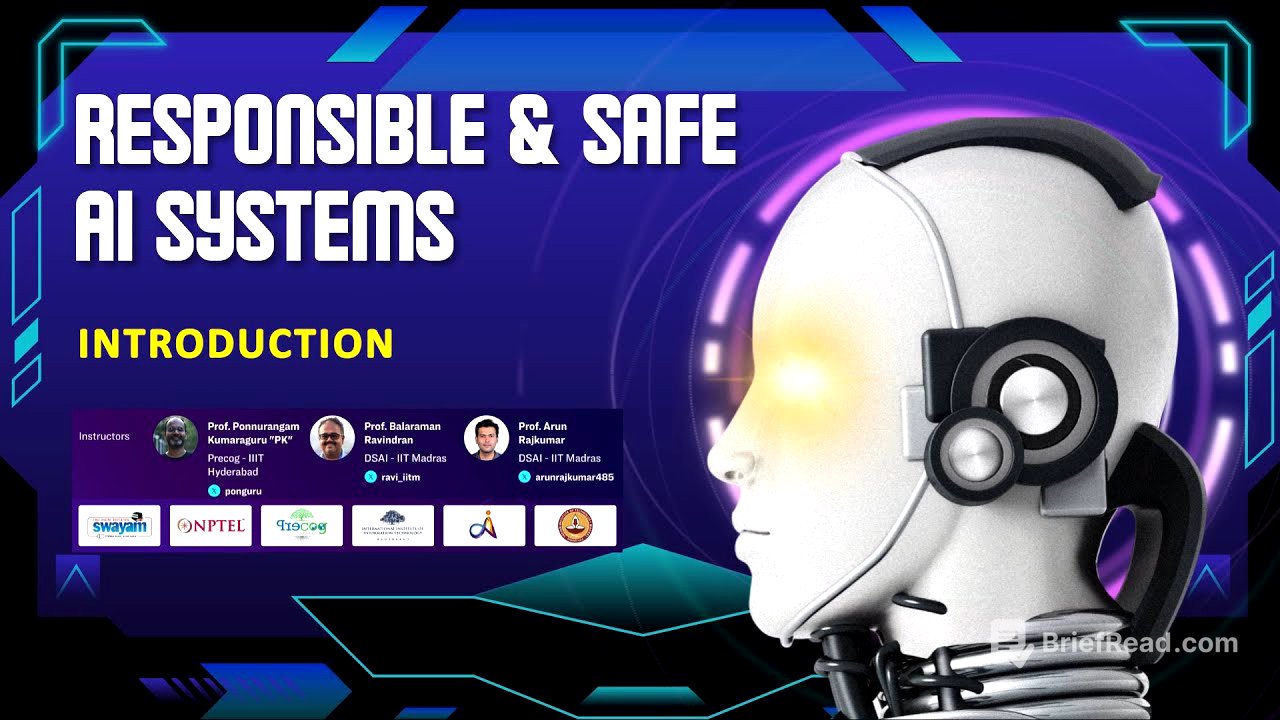TLDR;
This video serves as an introduction to the "Responsible and Safe AI" course. PKM, along with Professors Ravi and Arun, will be teaching the course. The course aims to equip students with the ability to recognise potential harms caused by AI, reason about the trajectory of AI development, and learn about the latest research agendas for making AI systems safer. The course will cover topics such as AI capabilities, risks, technical methods for safety, alignment, privacy, fairness, and responsible AI in specific domains like legal AI. The course includes lectures, paper discussions, activities, and potential fireside chats with researchers and panel discussions. Students are encouraged to connect real-world examples to the course content and share their insights.
- Course focuses on responsible and safe AI practices.
- Includes lectures, discussions, and activities.
- Encourages real-world application and sharing of insights.
Course Introduction and Faculty Background [0:16]
PKM introduces the course "Responsible and Safe AI," mentioning that he, Professor Ravi, and Professor Arun will be teaching it. PKM shares his background, including his PhD from CMU, 30 semesters of teaching experience, and current focus on responsible AI and AI safety. He has previously taught courses on social network analysis, cyber security, and human-computer interaction. He also mentions teaching a similar course on campus at IIIT Hyderabad and encourages students to introduce themselves on the mailing list, sharing their name, institute, city, and goals for the course.
Why This Course Matters [2:49]
The instructors are teaching this course because they have been actively working and publishing in this area. PKM mentions he recently taught a full-credit course titled "Responsible and Safe AI Systems" and shares the story of how they used Chat GPT to brainstorm the course title. He also lists his previous courses on NPTEL, including privacy and security in online social media and human-computer interaction. He expresses satisfaction with student engagement in past courses, noting that many students share their course completion certificates on LinkedIn and Twitter.
Course Objectives and Teaching Methods [6:57]
The course aims to enable students to recognise potential harms caused by AI, reason about the trajectory of AI development, and learn about the latest research agendas for making AI systems safer. The teaching methods include lectures, reading research papers, and discussions. Students are encouraged to participate actively in discussions and apply the concepts learned by trying out ideas during the semester. Opportunities for internships and projects with the instructors may also arise for top-performing students.
Course Topics Overview [10:33]
The course will cover AI capabilities and associated risks, technical methods for making AI safer and more responsible (such as robustness, interpretability, consistency, and transparency), and the alignment problem between humans and AI systems. Professor Arun will discuss privacy and fairness in AI, including building fair algorithms and addressing bias and stereotypes in AI models. The course will also explore responsible AI in specific domains like legal AI, examining the penetration of AI in the legal field and associated precautions.
Interactive Elements: Paper Readings, Fireside Chats, and Panel Discussions [13:42]
The course plans to incorporate paper readings, where students will read and discuss research papers. The instructors aim to host fireside chats with popular researchers and practitioners, potentially involving students in asking questions. Panel discussions will feature experts from academia, activism, and industry to discuss current issues and future directions in responsible AI. PKM notes the rapid advancements in these topics and encourages students to connect course content with real-world examples they encounter in news and media.
Course Logistics and Encouragement for Active Participation [17:04]
The course will have TAs who will be introduced on the mailing list and during live sessions. Given the evolving nature of the topic, current events will be discussed in class. Students are encouraged to attend weekly live sessions and share interesting findings. A course website will be maintained for public access to content. PKM urges students to reflect on AI capabilities they have witnessed in their lifetime and share these observations, relating them to specific domains like transportation, healthcare, banking, entertainment, e-commerce, and education.
Activity: Reflecting on AI Capabilities [22:48]
As an introductory activity, students are asked to reflect on AI capabilities they have observed in their lives, considering categories like transportation, healthcare, banking, entertainment, e-commerce, and education. They are also asked to watch a 24-minute video and share their key takeaways, agreements, disagreements, and questions on the mailing list by Saturday, using the hashtag #activityintro in the subject line. The instructors will engage with these responses on the mailing list and during live sessions.









